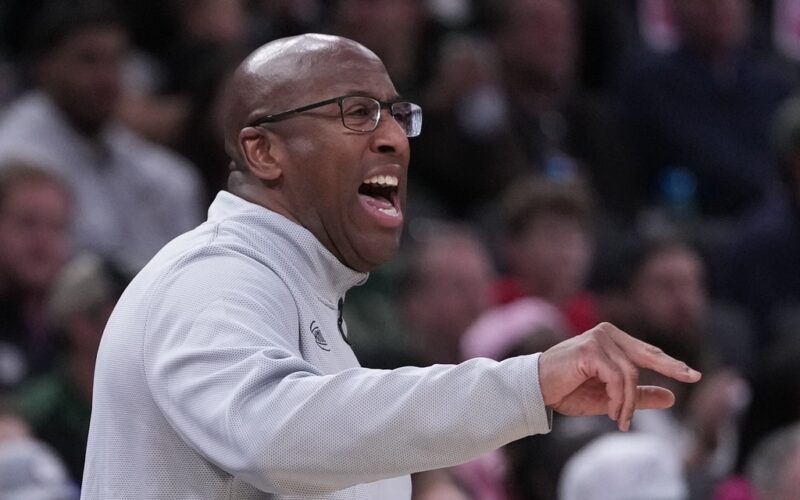Karl-Anthony Towns has been through this before.
Four head coaches across nine seasons in Minnesota prepared him for every next chapter — and for the change that came after his first year in New York.
Out went Tom Thibodeau, a familiar face from Towns’ Timberwolves days. In came Mike Brown, ready to challenge habits and raise the ceiling on a team with championship ambitions.
“The experiences are always different,” Towns said after practice on Friday. “But Mike is different from any coach I’ve ever dealt with, and his system is different than I’ve ever dealt with.
“But every coach has their different quirks that make them who they are.”
The early returns have been promising — not only in the playbook, where Brown’s offensive overhaul has powered New York to a 5-3 record and an undefeated 5-0 start at home — but in the tone and temperament of the locker room.
Eight games in, the fit between coach and roster already feels real.
“You can be the best player or the youngest player on the team,” said Mikal Bridges. “He’s going to set you straight — every single guy. Don’t let nobody off the hook. I think it just shows a lot.”
Brown’s definition of leadership is simple — and deeply rooted in a lesson from Kenneth Chenault, the former American Express CEO and the first Black executive to lead a Fortune 500 company.
“I embrace it. I love it. It tells the tale clearer than a blue sky,” Brown said. “As a leader, you’ve gotta give hope while defining reality. So it doesn’t matter who it is — you’ve gotta keep it real with them. You’ve gotta tell them the truth.”
That directness has become a hallmark of Brown’s first season at Madison Square Garden.
Most coaches don’t pull players aside mid-game. Brown does.
It’s happened to nearly everyone on the roster — one through fifteen. If he sees something he doesn’t like, he addresses it immediately. Sometimes he’ll stop a player during a dead ball. Sometimes he’ll pull him out, explain the issue, then send him right back in.
He doesn’t need to raise his voice to make his point.
“We have not provoked him enough to make him yell at us yet,” said team captain Jalen Brunson. “He definitely holds people accountable, right then and there. We appreciate that. That’s gonna help us get better.”
Brown’s communication style traces back to his years under Gregg Popovich and Steve Kerr — two of the best to ever do it. He served on Popovich’s staff in San Antonio from 2000 to 2003, helping the Spurs capture the 2003 NBA title, then won three more rings alongside Kerr in Golden State from 2016 to 2022.
“Steve Kerr and Pop — they were the best communicators I’ve been around,” Brown said. “It just seems really natural for them, and I don’t think they ever felt that you can over-communicate.
“So I try to take that from both of them. I’m human — I’m gonna make mistakes — but I try to communicate as best I can, whether it’s in practice, shootaround, or over the course of a game.
“Because guys have questions. Everybody has questions all the time. Sometimes they may not want to ask because they don’t feel it’s appropriate. So I try to be proactive and let them know what’s going on to erase any doubt they might have in their minds.”
Bridges says Brown’s approach reminds him of his first NBA coach, Monty Williams — another communicator who builds connections as much as he builds schemes.
“Monty is a little old school with his verbiage,” Bridges said. “And he’s just a little country — they say things a little different down in the south.”
Like Williams, Brown doesn’t just correct players after mistakes — he coaches them through live situations, sometimes even when they’ve done nothing wrong.
“Sometimes even if you didn’t do anything wrong, Mike does a great job of that,” Bridges said. “For example, in the game, I think he was taking me out and telling me what the minutes were going to be. He kind of let me know, ‘I’m taking you out right now not because you did anything wrong — it’s just that we’re putting you back at this moment.’ It’s just communication.”
That clarity, Bridges says, prevents players from spiraling into self-doubt.
“Sometimes you can be playing hard and you don’t know if you messed up on a couple of things,” he said. “If you get taken out, you’re kind of looking around, and it’s like, ‘Did I do something wrong?’
“Verbalizing that gives you confidence. You’re not wondering.”
True to his name, Brown is delivering express results at Madison Square Garden.
On the court, his Knicks are playing faster, shooting more threes, and sharpening the offense that once stalled in spurts.
Off the court, the message is universal — and it’s one word the entire locker room repeats: accountability.
“Accountability is high — real high,” Bridges said. “He doesn’t really yell, but he gets on you. But it’s all love, and it’s all things you know you should be doing. You kind of know that you should be better. He’s just talking to you.”








